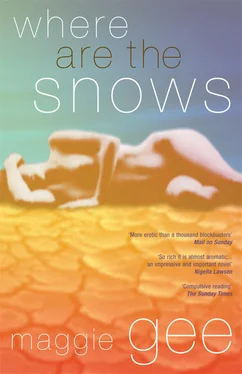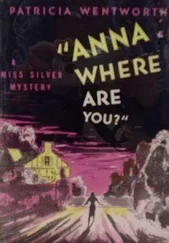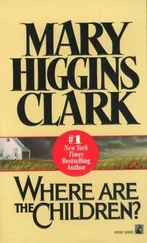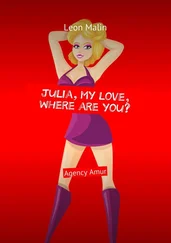(My father denied all memory of this. My mother recounted it lovingly.)
They fell in love poor and fell out of it rich. By the time he died they were estranged, though they still lived together in a farmhouse in Surrey whose only claim to be a farm now rested on an aged plough, restored and polished, a foil for the roses, its neat brass label giving date and provenance. My mother always meant to remove that label, but the effort was too much for her. The house was too big, and they were too different once my childish presence no longer linked them, but they stayed together because they had promised.
They stayed together in retirement, she stayed with him after he had his stroke and at the end when the nightmares came, when my father realised they were not alone. In the middle of the night he heard bellowing ghosts of slaughtered cattle in the empty outhouses, and then he began to grieve at last for all the deaths he had tried not to notice. He blamed my mother for not being Jewish, for making their home near the plough and the roses.
— They stayed together because they had promised. It was ordinary, then, to stay together. They stayed together, he died with her.
Yes, Alexandra. They stayed together.
— But this came later, when I had left home. My boyhood and youth were as solidly ordinary as my father could have wished. I was what they call a good all-rounder. Arts and sciences, top of both. Which meant I was in for a tug-of-war, since my father assumed I should follow him and become a partner in the family firm, whereas mother — my dear, sweet, casual mother with her sudden swoops of inspired kindness and her brief exhibitions of intense concentration — remembered each poetry prize I had won, each school play I had postured in. ‘You’re so handsome, darling, don’t be an accountant. Don’t bury yourself in that awful fug.’
— No one ever said that my mother was tactful. But she understood about happiness. That’s why she loved Alex, from the start, when she should have disapproved, when she should have been loyal to my first wife Penelope, the mother of her grandchildren, after all, the wife I was married to when I met Alex…
(I’ll get to Penelope later. No time now.)
I compromised. I read Greats at Oxford, the education of a gentleman, training me for nothing, committing me to nothing. I thought I was elegant and urbane (in retrospect, arrogant, rude and narrow). Girls fell in love with me, real girls, beautiful under-graduates, not the larger underclass of secretaries and husband-hunters… Life would be flavourless without a little arrogance.
I was suddenly as handsome as my mother had said. And an actor, just as she had hoped. A student actor, Romeo, Antony, Tristan in an adaptation of the lovers’ legend that I helped to write, or overwrite…
Ah, you will say. So that was the start. A hopeless romantic, even then. In fact, my thoughts were not at all romantic. Once I lost my virginity I couldn’t believe I had wasted twenty years not having this bliss. I wanted to have it every day, I wanted to have it three times a day. But the girls were shy, even when they were loving, and codes were strict, and walls were high, and beds, when you got there, horribly narrow.
(Don’t think I am callow, or crude. Since then I have called myself a feminist. But I was young, and ignorant, and plagued by erections when taking exams. I’ve been plagued by erections all my life; they were only a blessing when Alex was there…)
Despite all this, I got a good degree, and was President of OUDS, the Dramatic Society. A job with a theatre company was fixed. I was packing my trunk to come back to London, where I meant to find rooms near theatre-land. Then everything changed, without warning. My father had his stroke.
I had always thought my father a bore, and the conviction had grown with the Oxford years of prancing about with golden children. My friends were the sons of lords and poets, land-owners, dashing entrepreneurs. If the parents appeared in term-time, they greeted their children with loud assured voices.
My father was dull and quiet by comparison. He’d only come to visit me once, and that was in my very first term. I looked down upon him from my second-floor window, his dark coat hunched around him as he walked across the quad; I was too mean to greet him, wishing him dead as he peered up anxiously at other people’s windows to see if they were looking at him. I didn’t call his name even when he unfolded an inch of white paper to check which staircase and it blew away and he scuttled after it, sideways, humbly, tripping and slithering, a tiny beetle on the great gold quadrangle.
I remembered that moment three years later when the phone call came about my father’s stroke. At first it seemed he would never walk again. His mind was untouched, but his speech was gone. He wrote me a letter, a strange new father, in a spiderish, chaotic hand, explaining my terrifying new duty.
I still don’t know why I did what he asked. I had never been a boy to do what was asked. I am awkward, stubborn, still. But I thought he would die at once, and I felt I was somehow guilty. I dashed off a letter to the theatre company, melodramatic and apologetic, and another, longer, soberly phrased, proposing myself as he had suggested.
The good life vanished like a dream. I was articled to a rival firm of accountants, so I could enter the family firm in due course as a conquering lord, not a fallible minion.
My-son-the-accountant-who-went-to-Oxford.
‘You were mad to agree,’ my mother said.
I can hear her still as clear as the limpid lap-slap-lap of the waves down there. Louder than usual this evening. The tides are higher every day, pushing up under the bridges, through the crevices, under the grey-pink walls… ‘Mad to agree… mad to do it.’ It’s mad to stay in Venice, now. Probably mad to stay alive, but we all cling on. I love life still.
What I did all those years ago wasn’t mad. It was an act of love, perhaps the only one I ever performed for my father. Fifty years later I don’t regret it.
‘You and your father. Mad as hatters.’ There’s her voice, liquid, fluting and all her life with a hint of the debutante who said ‘How kind’ to my panting father, as he skidded to a halt with her handbag in his hand, that day in the square in the 1920s, sending up a shower of gravel and pigeons.
Outside my window the gulls are competing with pigeons for fish-heads and heels of that coarse brown bread. My cook Lucia is throwing her leftovers into the canal just out of sight. I see a hand, a fountain of pieces, then the birds sweep across, their heavy bodies briefly gilded by the evening sunlight, then harsh sea-calls and the clapping of wings join the lapping water. Hard strong wings.
Gulls and pigeons are dirty birds, opportunists who should not be encouraged. But this is Venice. It belongs to them. To gulls and pigeons, cats and rats.
To drowning palaces and mad old men.
Here is my supper. Slivers of delicate pink-brown liver and pale pink fungus, a tomato salad in a pale green bowl. The wine, thank God, is red as blood, fit for a hero, not the timorous invalid the rest suggests. Lucia thinks I need mothering, or rather, since she is half my age, Lucia thinks I need a nurse-maid. A glass of wine, quick, then another. Fill me with coarseness, blood and iron. Forget my parents, my dutiful past. Forget I am a child of England. Let’s skip a little, all those boring years when I earned my living, got married, bred, left my wife and found true love…
Let me tell you about my life as a hero. It’s just possible that you think you know me, for I had a certain renown…
Too pompous. Try again.
I enjoyed a certain temporary fame after the drama of five years ago. People thought they knew all about me. About us. About me and Alex.
Читать дальше












